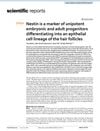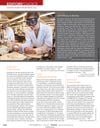 1 citations,
October 2022 in “Scientific reports”
1 citations,
October 2022 in “Scientific reports” Nestin identifies specific progenitor cells in hair follicles that can become outer root sheath cells.
 1 citations,
March 2016 in “Neurotoxicity Research”
1 citations,
March 2016 in “Neurotoxicity Research” Finasteride may protect brain and improve behavior in rats with liver failure.
160 citations,
April 2014 in “Drug discovery today” Melatonin helps regulate sleep and may aid in treating various health issues.
25 citations,
January 2015 in “World journal of stem cells” Hair follicle stem cells can become different cell types and may help treat neurodegenerative disorders.
 13 citations,
November 2021 in “Frontiers in Immunology”
13 citations,
November 2021 in “Frontiers in Immunology” Melatonin could be an effective treatment for Alzheimer's Disease and rosacea.
 1 citations,
October 2022 in “Springer eBooks”
1 citations,
October 2022 in “Springer eBooks” Testosterone is key for male sexual function, and treating hormone imbalances can improve sexual issues.
5 citations,
December 2018 in “The Journal of clinical psychiatry/The journal of clinical psychiatry” Tamsulosin may slightly increase dementia risk compared to other treatments for enlarged prostate.
1 citations,
September 2023 in “Genes” DNA methylation likely doesn't cause different lambskin patterns in Hu sheep.
 10 citations,
September 2014 in “The Journal of Steroid Biochemistry and Molecular Biology”
10 citations,
September 2014 in “The Journal of Steroid Biochemistry and Molecular Biology” Allopregnanolone increases KCC2 expression in baby male rats' brains, while finasteride doesn't affect it.
March 2023 in “Epilepsia” Trilostane may help delay epilepsy development by increasing certain brain chemicals.
33 citations,
December 2017 in “Journal of neuroendocrinology” Sex and stress steroids quickly change brain cell structures in the hippocampus.
 1 citations,
May 2022 in “Research Square (Research Square)”
1 citations,
May 2022 in “Research Square (Research Square)” Acetate helps reduce depression in rats with PCOS by lowering specific gene expression and DNA changes in the brain.
 September 2013 in “Science”
September 2013 in “Science” Transplanted human Olig2+ astroglia may help improve learning and memory after a stroke.
 September 2013 in “Science”
September 2013 in “Science” The document concludes that human astrocytes aid stroke recovery, research confidence affects student career aspirations, collagen affects cancer spread, a microRNA suppresses brain cancer growth, calmodulin regulates water channels, and small magnesium pieces deform differently.
 22 citations,
December 2010 in “Journal of Cosmetic Dermatology”
22 citations,
December 2010 in “Journal of Cosmetic Dermatology” Finasteride may increase depression by reducing brain cell growth.
 September 2013 in “Science”
September 2013 in “Science” Certain astrocytes can protect the brain and improve recovery after a stroke, and a hair loss drug might reduce cancer spread.
 September 2013 in “Science”
September 2013 in “Science” Human stem cells can aid stroke recovery, research experiences boost students' career aspirations, minoxidil may reduce cancer spread, a molecule can slow tumor growth, a protein affects water flow in cells, magnesium behaves differently at tiny scales, and a new method detects slow-moving objects.
 September 2013 in “Science”
September 2013 in “Science” Undergraduate research experiences boost students' research skills, confidence, and career aspirations.
 September 2013 in “Science”
September 2013 in “Science” Special astrocytes improved learning and memory in rats after a stroke.
 September 2013 in “Science”
September 2013 in “Science” Special astroglia cells improved stroke recovery in rats, a hair growth drug reduced cancer spread, and tiny magnesium structures were more easily shaped.
 17 citations,
November 2014 in “American Journal of Physiology-gastrointestinal and Liver Physiology”
17 citations,
November 2014 in “American Journal of Physiology-gastrointestinal and Liver Physiology” Finasteride helps brain function in rats with liver-related brain issues.
 91 citations,
August 2014 in “Development”
91 citations,
August 2014 in “Development” The circadian clock is crucial for tissue renewal and regeneration, affecting stem cell functions and having implications for health and disease.
 42 citations,
December 2016 in “Cell Death & Differentiation”
42 citations,
December 2016 in “Cell Death & Differentiation” Damaging mitochondrial DNA in mice speeds up aging due to increased reactive oxygen species, not through the p53/p21 pathway.
 40 citations,
December 2019 in “Neurobiology of Stress”
40 citations,
December 2019 in “Neurobiology of Stress” Neuroactive steroids show promise for treating mental and neurological disorders by targeting GABA_A receptors.
 37 citations,
January 2019 in “JAMA Dermatology”
37 citations,
January 2019 in “JAMA Dermatology” People with Major Depressive Disorder have a higher chance of getting Alopecia Areata, and vice versa; antidepressants may lower this risk.
 27 citations,
June 2015 in “Revista Brasileira de Farmacognosia”
27 citations,
June 2015 in “Revista Brasileira de Farmacognosia” Safflower has been used in traditional medicine for centuries and shows promise in treating heart, brain, and inflammatory conditions, but more research is needed to ensure its safety.
 25 citations,
March 2017 in “Steroids”
25 citations,
March 2017 in “Steroids” Allopregnanolone increases growth and changes gene activity in human brain cancer cells.
 20 citations,
October 2003 in “The Journal of Dermatology”
20 citations,
October 2003 in “The Journal of Dermatology” DCP therapy causes side effects like weakness, flushing, headaches, and taste changes, but less frequently causes hypertension and diabetes.
18 citations,
September 2021 in “Journal of Neuroendocrinology” Neurosteroids can influence behavior by modulating brain inhibition, with potential for treating psychiatric disorders.
 16 citations,
July 2019 in “Journal of Cellular Biochemistry”
16 citations,
July 2019 in “Journal of Cellular Biochemistry” Wnt7a protein is crucial for development and tissue maintenance and plays varying roles in diseases and potential treatments.























